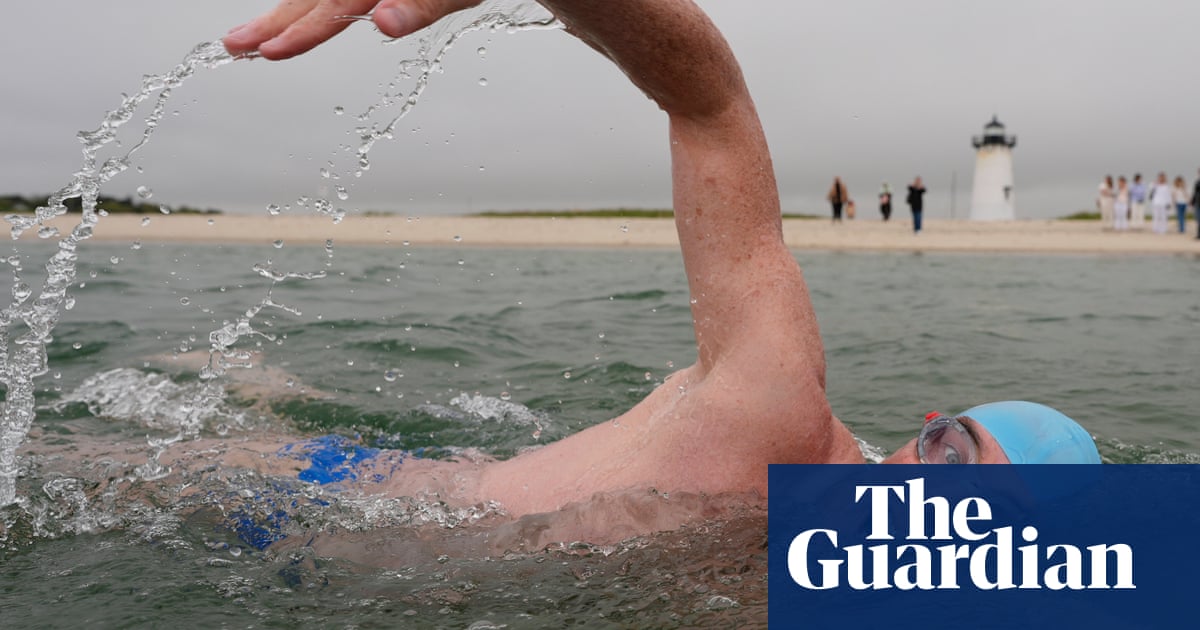A British-South African endurance athlete crossed the finish line of his 62-mile (100km) multiday swim around Martha’s Vineyard on Monday, becoming the first person to swim all the way around the island off the coast of Cape Cod.
Lewis Pugh, 55, began swimming multiple hours a day in the 47F (8C) water on 15 May to raise awareness about the plight ofsharks– as the filmJawsnears the 50th anniversary of its cinematic release.
The swimmer and campaigner has said he wants to change public perceptions and encourage protections for sharks, which are at risk from human threats and which he said the hit film wrongly maligned as “villains, as cold-blooded killers”.
Pugh hauled himself out of the water on Monday at the Edgartown Harbor lighthouse on Martha’s Vineyard, near whereJawswas filmed, which tells a story of a fictional, man-eating great white shark terrorizing a New England tourist coastal destination given the name of Amity Island.
“We’ve been fighting sharks for 50 years,” he said after completing the last 1.2 miles of the swim. “Now, we need to make peace with them.”
In total, Pugh swam for about 24 hours over 12 days. His first stop in Edgartown after greeting cheering fans on the beach as he completed his feat was at an ice-cream shop, where he enjoyed a cone of salted caramel and berry brownie.
Pugh said this was among his most difficult endurance swims in an almost 40-year career, which says a lot for someone who has swum near glaciers, including on Mount Everest, and volcanoes. He’s swum among hippos, crocodiles and polar bears. Pugh was the first athlete to swim across the north pole and complete a long-distance swim in every one of the world’s oceans.
He said he expected the swim to be difficult because of the low water temperature, the distance and the fact that it was happening during the start of the shark migration season. But the weather proved the most challenging element of all.
“It’s been a long journey, it really has, 12 days, cold water, constant wind, waves and then always thinking of what may be beneath me. It’s been a big swim. A very big swim,” he said. “When you swim for 12 days, you leave as one person and I think you come back as a different person with a new reflection on what you’ve been through.”
Day after day, Pugh entered the island’s chilly waters wearing just trunks, a cap and goggles, enduring foul weather as a nor’easter storm dumped 7 in of cold, pounding rain on parts of New England and flooded the streets on Martha’s Vineyard, the famous and beautiful island off southern Massachusetts where some prominent politicians, including former US president Barack Obama,choose to relaxand the history of whale hunting is almost visceral.
Some days, Pugh was only able to make it a little over half a mile before wind and waves made it impossible to see beyond an arm’s length in front of him. In some cases, he had to make up lost distance by swimming multiple legs in a day.
“I was just getting really cold and swallowing a lot of sea water, not making headway and then you’re constantly thinking: ‘Are we taking the right route here? Should we go further out to sea? Should we get closer in?’” he said. “And meanwhile you’re fighting currents.”
But Pugh, who has been named a United Nations patron of the oceans and often swims to raise awareness for environmental causes – said no swim is without risk, and that drastic measures are needed to get his message across: about 274,000 sharks are killed globally each day, a rate of nearly 100m every year, according to the American Association for the Advancement of Science.
On Monday, Pugh called the decimation of sharks an “ecocide”. “I think protecting sharks is the most important part of the jigsaw puzzle of protecting the oceans,” he said.
Jaws was released in the summer of 1975, based on the book, and setting new box office records.
Both director Steven Spielberg and author Peter Benchley expressed regret that many viewers became so afraid of sharks. Both later contributed to conservation efforts.
The Associated Press contributed reporting
